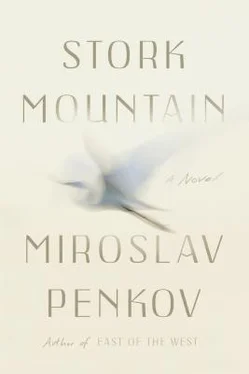Miroslav Penkov - Stork Mountain
Здесь есть возможность читать онлайн «Miroslav Penkov - Stork Mountain» весь текст электронной книги совершенно бесплатно (целиком полную версию без сокращений). В некоторых случаях можно слушать аудио, скачать через торрент в формате fb2 и присутствует краткое содержание. Год выпуска: 2016, Издательство: Farrar, Straus and Giroux, Жанр: Современная проза, на английском языке. Описание произведения, (предисловие) а так же отзывы посетителей доступны на портале библиотеки ЛибКат.
- Название:Stork Mountain
- Автор:
- Издательство:Farrar, Straus and Giroux
- Жанр:
- Год:2016
- ISBN:нет данных
- Рейтинг книги:4 / 5. Голосов: 1
-
Избранное:Добавить в избранное
- Отзывы:
-
Ваша оценка:
- 80
- 1
- 2
- 3
- 4
- 5
Stork Mountain: краткое содержание, описание и аннотация
Предлагаем к чтению аннотацию, описание, краткое содержание или предисловие (зависит от того, что написал сам автор книги «Stork Mountain»). Если вы не нашли необходимую информацию о книге — напишите в комментариях, мы постараемся отыскать её.
Stork Mountain — читать онлайн бесплатно полную книгу (весь текст) целиком
Ниже представлен текст книги, разбитый по страницам. Система сохранения места последней прочитанной страницы, позволяет с удобством читать онлайн бесплатно книгу «Stork Mountain», без необходимости каждый раз заново искать на чём Вы остановились. Поставьте закладку, и сможете в любой момент перейти на страницу, на которой закончили чтение.
Интервал:
Закладка:
“They think they have me figured out,” she said, and her voice dipped, raspy and low from the smoke. “My father. My mother. All of Klisura. But they don’t know what I’ve cooked up. The little plan I’ve plotted out.” She leaned in closer and whispered, her eyes bloodshot and swimming, the pupils themselves as large as stork nests. “The day I pick up my university diploma will be the day I disappear. Like smoke in air, like flame in wind. I’ll vanish without a trace. Without a note, without a word goodbye.”
Her voice, the stench of her breath, the enormity of her pitch-black pupils suddenly frightened me. And maybe it was out of fear that I asked, “And you don’t think that’s cruel?”
“Cruel,” she said. “What do you know of cruel? With your pockets full of gold, crossing the ocean in less time than it takes me to go to school. Cruel,” she said, and then was quiet. Her skin had turned the color of the rotting hay and I realized she had finished the entire joint — much more than she had intended or wanted to smoke. “I’ll give you cruel,” she said. “My sister makes me love her, and then she hangs around my neck like a stone. She is the anchor that won’t let me sail. Each night I pray to God. I say, Allah, my sister is the rope that chokes me, so sharpen my knife and let me cut her clean. Allah, you’ve stuffed my heart with hatred — I hate my father, this village, I hate myself. So make me hate my sister too. Make me despise her. What should I care that she needs me? What should I care that she will suffer once I’m gone? And each morning I love her more, and hate myself more for the pain I am about to cause her. My God,” she said, and held her face in her palms. Her shoulders rocked, this time with laughter. “You’re right to laugh. I’m such a mess. A hunchback with wolf teeth thirsty for Christian blood. Run away, my boy. I’ll gnaw your bones. I’ll eat your heart. Run while you can.”
I wanted to tell her that she was wrong, that problems in life sometimes had an almost miraculous way of resolving themselves if only we’d bear the suffering a little longer. Or so I’d heard. But then I thought of my own loneliness, depression, financial debt. Wasn’t this why I’d returned? To sell my land and see my problems solved. Or had I merely run away?
“When I was very little,” she said, “my grandmother, Allah rest her soul, taught me a trick for wrestling with demons. All her life, my grandfather had kept her well under his thumb. ‘A woman is like the mule, kazam ,’ she told me. ‘She has to learn to take the weight of her master and then his whip. But sometimes, darling, the whip opens burrows in your heart. And in these burrows, the Sheytan lays his evil eggs. When at night a woman lies in bed and dreams of cleavers, of slicing her husband’s throat like a he-goat’s, end to end, it’s the eggs of the Sheytan that she can hear hatching. I’ve dug a hole, kazam , behind the house. When an egg is about to hatch, I lean over the hole and I spit right in it. Every woman needs a hole in which to lay her evil eggs.’” Elif was watching me with a mournful smile. “You want to see the hole I dug?”
Before I could answer she was already rummaging through the straw, the sticks, the tufts of white hair I had seen lining the nest. She pulled out a bundled towel, black, with a single red thread that zigzagged through the cloth.
“For many years the Bulgarians on the Christian bank and the nestinari didn’t mix. So great was the peasants’ fear of the fire dancers that they wouldn’t even let them bury in the village cemetery the skulls they’d brought. That’s what the hag told me anyway. ‘Bury them in the water,’ the peasants had shouted, ‘bury them in the clouds, for all we care. But not beside our people.’ And so the nestinari buried their dead in the air.”
Gently she laid the bundle between us on the hay, gently unwrapped the towel.
“This is the hole in which I whisper,” she said, “my kazam , my darling.”
Inside the towel was a human skull. Perfectly preserved, except for a few teeth on the side, which shone like pearls. “They buried them up in this walnut tree, up in these nests. At least a hundred skulls I’ve found scattered about, some wrapped in towels, others not. The storks don’t touch them. They lay their eggs beside them, and the babies hatch right by the skulls. And ever since I was a girl, after a fight with Father, I’d climb up here, and take my darling, and bring her to my lips like so. And I would whisper into her hollow eye the pains that ate me. And she would grow heavy with my devils, and I would grow light.” She held the skull now and watched it with a tenderness I hadn’t seen in her before. “My kazam ,” she said, “my darling. The things her eyes have heard.” And she laid it gently back in the towel, wrapped it, and hid it in the hay.
We sat in silence after this. My heart was pounding, but gradually I grew calmer. Only once did Elif speak. “What you did yesterday, I thank you for it. Your grandpa is a good man. He was back in his day a teacher in Klisura. But that’s not why my mother trusts him. Back in the day, or so the hag told us, your grandpa was the vekilin for the fire dancers. They’d chosen him for that themselves.”
Then she was quiet. A warm, light rain had begun to fall and I let it wash my face and listened to its gentle rustle. I thought of my grandfather, leader of the nestinari , and wondered why he had never told me the story of this before. But then, he’d never spoken of his life in Klisura. The branches above us glistened; the sun was blazing higher in the sky. I turned to Elif and watched her, her eyes closed, her hair, her face, her whole body shimmering with raindrops like glowing embers. And Saint Elena, I remembered her saying, like light rain following behind.
On our way out of the village, elbowing through branches and grass, Elif had suddenly stopped to face me. “You had the world to choose,” she said, “and you came to Klisura.” Not wanting to speak of my plans to sell the twenty acres, I told her nothing. “What are you looking for here?” she’d asked, and I’d kept quiet. But now, if she were to ask me again, I would know what to say.
PART TWO
ONE
THE YEAR WAS 1866. And in Klisura, on the feast day of Saint Constantine, a boy was born. As was tradition, they named him Kosta, after the saint. When Kosta was twelve, the first wave of exodus spread through Eastern Thrace and through the Strandja Mountains. Russia was invading the Ottoman Empire. To free up space for the countless Turkish refugees pouring down from the north, the Ottoman army drowned entire Christian villages in blood. Hundreds of thousands fled and so did Kosta. He ended up in Sofia, where in time he began his studies in the Military University.
When in 1885 Serbia attacked, Kosta, by then a young cadet, interrupted his schooling and joined the Bulgarian army. He fought at Slivnitsa, the decisive battle. There he was wounded in the foot, from which an awkward limp remained until his end. There he saw the invader stopped and pushed out.
For fifteen years after graduating from the university, Kosta served as an officer in the army. He became a captain; his soldiers feared and respected him in equal measure. “His blood is packed with gunpowder from Slivnitsa,” they said. “Don’t bring a match too close and you’ll be fine.” But in 1903, despite his promising career, Captain Kosta discharged himself and returned to the Strandja. He had joined a network of rebels who had been plotting a massive uprising. Soon enough, they hoped, Macedonia and Eastern Thrace would be part of a new, large, free Bulgaria. Kosta did not ask for a leadership position based on his military rank. He followed orders humbly, without much talk.
Читать дальшеИнтервал:
Закладка:
Похожие книги на «Stork Mountain»
Представляем Вашему вниманию похожие книги на «Stork Mountain» списком для выбора. Мы отобрали схожую по названию и смыслу литературу в надежде предоставить читателям больше вариантов отыскать новые, интересные, ещё непрочитанные произведения.
Обсуждение, отзывы о книге «Stork Mountain» и просто собственные мнения читателей. Оставьте ваши комментарии, напишите, что Вы думаете о произведении, его смысле или главных героях. Укажите что конкретно понравилось, а что нет, и почему Вы так считаете.











